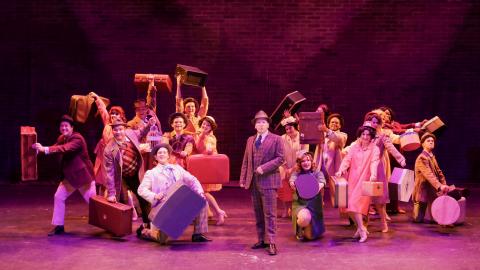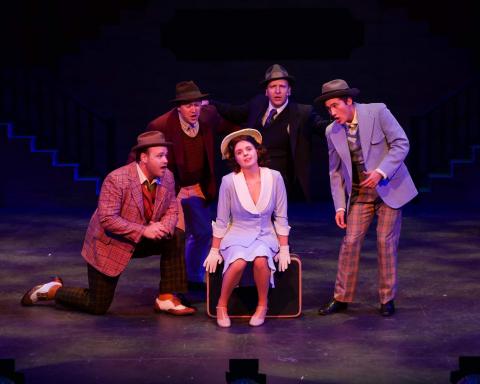PREVIEW: The Umbrella Stage Company Presents 42nd Street from The Umbrella on Vimeo.
Presented by The Umbrella Stage Company
Music by Harry Warren
Lyrics by Al Dubin
Book by Michael Stewart & Mark Bramble
Based on the novel by Bradford Ropes
Directed by Brian Boruta
Music direction by James Murphy
Musical restaging and new choreography by Lara Finn Banister
September 27 – October 20, 2019
The Umbrella Main Stage
Concord, MA
The Umbrella Stage on Facebook
Critique by Kitty Drexel
(Concord, MA) 42nd Street is a show-within-a-show jukebox musical serving as a thinly veiled excuse to pair tap dance with 1930’s Broadway hits. The 1933 Depression-era movie had choreography by Busby Berkeley and was nominated for an Academy Award. The movie (and eventually the musical) has deeply impacted musical theatre. Bullets Over Broadway, Kiss Me Kate and other backstage musicals have all been influenced by 42nd Street’s incarnations. It’s a classic but carries with it the problems of its time.
“Julian Marsh (Todd Yard) is doing a show!” And he needs two dozen dancers plus one to fill out his ensemble. Marsh is one chorus girl short. Enter Peggy Sawyer (Gillian Mariner Gordon), a guileless ingenue with oodles of dance experience, a swell disposition and no sense of danger. Experienced stage queen Dorothy Brock (Aimee Doherty) will rule the stage with wolfish tenor Billy Lawlor (Mickey T. White) in the production of Pretty Lady. Can Peggy and the gang get their show to Broadway before Dorothy’s gargantuan ego implodes? Peggy and her hot hoofing crew will have to dance until their feet fall off to find out.
Tap dancing is the draw to 42nd Street. Anyone interested in the show or its character development or humanity’s universal truths will be severely disappointed. The characters are so flat that they are jokes in the show. Near the beginning, Annietime Annie (Ashley Nicole Martin) tells Peggy that’s she’s a good tapper. In reply, Peggy says, “I know.” Such phrasing allows the script to skip directly to Peggy dancing in Marsh’s show.

The cast; photo credit: Kai Chao.
The choreography by Lara Finn Banister does not disappoint. As executed by the cast, numbers such as “Audition,” “Go Into Your Dance,” “We’re In the Money” among others had the feet of audience members inaccurately moving in time. Even “Dames” with its clockwork ladies in flesh-pink leotards had an appeal. The female ensemble looked like sexually objectified jewelry box ballerinas as they pointed and twirled. Meanwhile, the men got to keep all their clothing on during their routines.
Stewart and Bramble don’t give character arcs to Dorothy or Peggy. Yet the ladies do the very best with what they are given. Doherty, a skilled dancer in her own right, plays the dance-less Brock with great comedic timing. Her melodramatic voguing in “Shadow Waltz” is very funny. Gordon’s sweet innocence has the audience eating out of her hands. Her fearful rendition of “Young and Healthy,” is so sincere as to be relatable. We absolutely believe that Gordon is running towards the very thing which terrifies her.
Peggy’s switch from a naive babe in arms to sultry songstress in “Forty-Second Street” is not believable. Gordon’s dancing is sound but her Peggy would be eaten alive by a horny sailor. Peggy has no edge. Billy (White) dominates the stage during their duet. We don’t believe that Peggy knows how to take it back.
42nd Street has a second-act assault scene. As originally written, Julian Marsh is “coaching” Peggy Sawyer for her big night in Pretty Lady. Rather than let Peggy rest and eat, Marsh assaults her. His excuse is that he’s preparing her for a love scene. Speechless, Peggy retreats into her dressing room where cast members coax her out of her shock and convince her to perform. Marsh kisses her one last time and Peggy takes the stage.
The original staging of 42nd Street had Marsh and Peggy falling in love as a result of Marsh’s assault. The Umbrella’s staging offers more compassion to victims; Peggy is still wary of Marsh but offers him friendship within a public forum. Small changes such as a gentle forehead kiss instead of a coerced mouth kiss and purposeful distance between actors acknowledge the show’s problematic content. Boruta, Murphy and Banister cannot legally rewrite 42nd Street without altering the integrity of the show. They could and did make accommodations within the script where they could.
The character Julian Marsh has a locked and loaded God complex with a hair-trigger. Directors like him are the reason the Chicago Theatre Standards protocol was invented. To his great credit, Todd Yard imbues Marsh with an anxious charisma that convinces the audience that his Marsh doesn’t mean to be such an insensitive bully; it’s just he’s under so much pressure to make Pretty Lady a success. Yard’s performance doesn’t excuse Marsh’s behavior but it does make him more palatable.
The Umbrella Arts Community Center has recently completed a massive overhaul of its space. It has been transformed and looks fantastic. The main stage’s design scheme combines classic art deco details with modern staples such as flatscreen monitors from which the audience can watch the conductor search his phone during intermission. There is now a gallery and exhibition space for visiting artists. The black box will host Fences in November. Kudos to everyone involved for such a remarkable metamorphosis of the space!

42nd Street was the last musical of my high school career. It is the only musical I ever tapped in, and my first intentional kickline (versus all those accidental kicklines that just happened at theatre camp). I’m a sucker for nostalgia. Watching this production brought back so many fond, ridiculous, wonderful memories.
The Umbrella’s happy go lucky production is full of joy. It’s the kind of joy that spread from the stage and into the audience. If a classic musical with happy feet and sappy showtunes are what you want, 42nd Street will surely satisfy.
